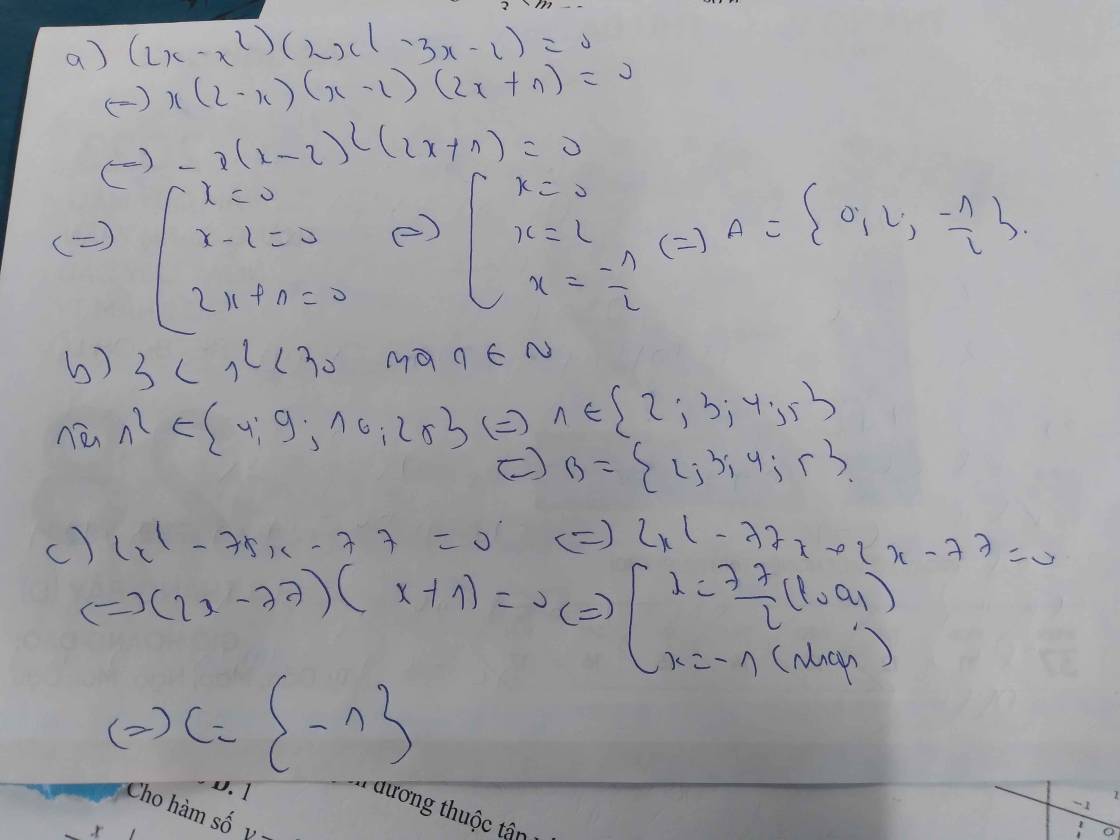Hãy nhập câu hỏi của bạn vào đây, nếu là tài khoản VIP, bạn sẽ được ưu tiên trả lời.

a: A={x\(\in R\)|x^2+x-6=0 hoặc 3x^2-10x+8=0}
=>x^2+x-6=0 hoặc 3x^2-10x+8=0
=>(x+3)(x-2)=0 hoặc (x-2)(3x-4)=0
=>\(x\in\left\{-3;2;\dfrac{4}{3}\right\}\)
=>A={-3;2;4/3}
B={x\(\in\)R|x^2-2x-2=0 hoặc 2x^2-7x+6=0}
=>x^2-2x-2=0 hoặc 2x^2-7x+6=0
=>\(x\in\left\{1+\sqrt{3};1-\sqrt{3};2;\dfrac{3}{2}\right\}\)
=>\(B=\left\{1+\sqrt{3};1-\sqrt{3};2;\dfrac{3}{2}\right\}\)
A={-3;2;4/3}
b: \(B\subset X;X\subset A\)
=>\(B\subset A\)(vô lý)
Vậy: KHông có tập hợp X thỏa mãn đề bài

\(A=[4;+\infty)\)
\(B=\left(6;9\right)\)
\(B\backslash A=\varnothing\)

`#3107.101107`
a,
\(\text{A = }\left\{x\in R\text{ | }\left(2x-x^2\right)\left(3x-2\right)=0\right\}\)
`<=> (2x - x^2)(3x - 2) = 0`
`<=>`\(\left[{}\begin{matrix}2x-x^2=0\\3x-2=0\end{matrix}\right.\)
`<=>`\(\left[{}\begin{matrix}x\left(2-x\right)=0\\3x=2\end{matrix}\right.\)
`<=>`\(\left[{}\begin{matrix}x=0\\2-x=0\\x=\dfrac{2}{3}\end{matrix}\right.\)
`<=>`\(\left[{}\begin{matrix}x=0\\x=2\\x=\dfrac{2}{3}\end{matrix}\right.\)
Vậy, `A = {0; 2; 2/3}`
b,
\(\text{B = }\left\{x\in R\text{ | }2x^3-3x^2-5x=0\right\}\)
`<=> 2x^3 - 3x^2 - 5x = 0`
`<=> x(2x^2 - 3x - 5) = 0`
`<=>`\(\left[{}\begin{matrix}x=0\\2x^2-3x-5=0\end{matrix}\right.\)
`<=>`\(\left[{}\begin{matrix}x=0\\2x^2-2x+5x-5=0\end{matrix}\right.\)
`<=>`\(\left[{}\begin{matrix}x=0\\\left(2x^2-2x\right)+\left(5x-5\right)=0\end{matrix}\right.\)
`<=>`\(\left[{}\begin{matrix}x=0\\2x\left(x-1\right)+5\left(x-1\right)=0\end{matrix}\right.\)
`<=>`\(\left[{}\begin{matrix}x=0\\\left(2x+5\right)\left(x-1\right)=0\end{matrix}\right.\)
`<=>`\(\left[{}\begin{matrix}x=0\\2x+5=0\\x-1=0\end{matrix}\right.\)
`<=>`\(\left[{}\begin{matrix}x=0\\x=-\dfrac{5}{2}\\x=1\end{matrix}\right.\)
Vậy, `B = {-5/2; 0; 1}.`
c,
\(\text{C = }\left\{x\in Z\text{ | }2x^2-75x-77=0\right\}\)
`<=> 2x^2 - 75x - 77 = 0`
`<=> 2x^2 - 2x + 77x - 77 = 0`
`<=> (2x^2 - 2x) + (77x - 77) = 0`
`<=> 2x(x - 1) + 77(x - 1) = 0`
`<=> (2x + 77)(x - 1) = 0`
`<=>`\(\left[{}\begin{matrix}2x+77=0\\x-1=0\end{matrix}\right.\)
`<=>`\(\left[{}\begin{matrix}2x=-77\\x=1\end{matrix}\right.\)
`<=>`\(\left[{}\begin{matrix}x=-\dfrac{77}{2}\\x=1\end{matrix}\right.\)
Vậy, `C = {-77/2; 1}`
d,
\(\text{D = }\left\{x\in R\text{ | }\left(x^2-x-2\right)\left(x^2-9\right)=0\right\}\)
`<=> (x^2 - x - 2)(x^2 - 9) = 0`
`<=>`\(\left[{}\begin{matrix}x^2-x-2=0\\x^2-9=0\end{matrix}\right.\)
`<=>`\(\left[{}\begin{matrix}x^2+x-2x-2=0\\x^2=9\end{matrix}\right.\)
`<=>`\(\left[{}\begin{matrix}\left(x^2+x\right)-\left(2x+2\right)=0\\x^2=\left(\pm3\right)^2\end{matrix}\right.\)
`<=>`\(\left[{}\begin{matrix}x\left(x+1\right)-2\left(x+1\right)=0\\x=\pm3\end{matrix}\right.\)
`<=>`\(\left[{}\begin{matrix}\left(x-2\right)\left(x+1\right)=0\\x=\pm3\end{matrix}\right.\)
`<=>`\(\left[{}\begin{matrix}x-2=0\\x+1=0\\x=\pm3\end{matrix}\right.\)
`<=>`\(\left[{}\begin{matrix}x=2\\x=-1\\x=\pm3\end{matrix}\right.\)
Vậy, `D = {-1; -3; 2; 3}.`

a: A=[1;+∞)
B=(-∞;3]
b: A giao B=[1;3]
A hợp B=R
A\B=(3;+∞)
B\A=(-∞;1)